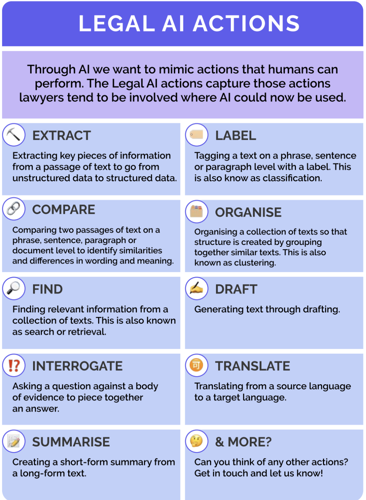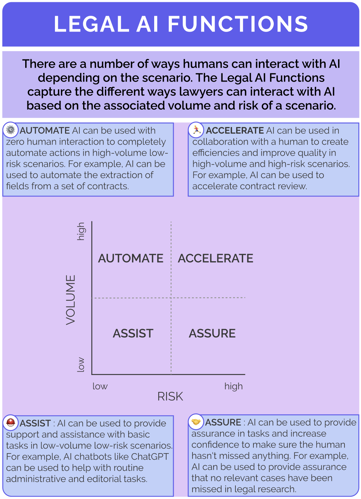Legal AI FAQs: Expert Answers to Common Questions
Let’s be honest: AI in legal feels like a minefield. One day it’s “AI will replace lawyers”; the next it’s “AI will solve everything.” To cut through the hype, we hosted a live Ask Me Anything (AMA) with Uwais Iqbal, founder of simplexico, an AI consultancy that works directly with law firms to implement AI in a practical, safe, and effective way.
Here are the most common questions legal professionals ask, and Uwais’ straight answers, in his own words, plus some quick tips you can act on.
You can watch the full session OnDemand below.
- What do we actually mean by “AI” in a legal context?
- How can AI improve the efficiency and effectiveness of legal research, review and case management?
- What tasks should lawyers never trust AI to do?
- How can lawyers assess the accuracy and reliability of AI tools?
- What about confidentiality and data protection?
- Will LLMs replace law firms or can they coexist?
- Should ethical guardrails be built into legal AI tools or rely on lawyers’ judgment?
- Given hallucinations and context limits, how do we handle long legal documents?
- What can firms do about legal staff asking AI to complete their legal training courses?
- Are law firms really changing, or is this innovation theatre?
- Do chatbots “tell you what you want to hear”? What then?
What do we actually mean by “AI” in a legal context?
Uwais Iqbal:
“We like to use the definition of AI, thinking about it as a technique where you want to try and replicate aspects of what humans can do with their intelligence… specifically in the legal industry… how can we take elements of practice or elements of cognitive work that lawyers actually do and explore if there are ways that machines can replicate, automate or help accelerate aspects of what lawyers are doing.”
“Think of legal AI as a set of tools that offload parts of the cognitive workload - reading, retrieving, organising, summarising - so lawyers can focus on reasoning, judgement, context and client advice.”
Further reading: What is Legal AI and how is it transforming law firms?

How can AI improve the efficiency and effectiveness of legal research, review and case management?
“Legal research involves reading lots of information, curating relevant content and then summarising and aggregating that information."
"With AI, we want to offload some of that cognitive work so that we can optimise the lawyer’s cognitive focus on the high-level work of reasoning, context, legal understanding and legal opinion and judgment.”
In a nutshell, use AI for high-volume tasks like research, document sorting, and first-pass summaries, so lawyers can focus on thinking instead of paperwork.
Further reading: How to use AI in legal case management to improve efficiency
What tasks should lawyers never trust AI to do?
“I think the question comes down to risk and how bad the consequence would be if something goes wrong…"
"High risk: You want a human still to be in control of quality and output. The AI system is used either to accelerate or to provide assistance.
Low risk: You can think about AI as automation that removes the human completely… because it’s not going to make a big difference, if it makes a mistake.
There’s also the facet of assurance… can we use an AI system to sense check the output… e.g., check a drafted clause against standard precedents and detect deviations and risks.
At simplexico, we call these the functions of legal AI: acceleration, automation, assurance and assistance, and you can plot them on a 2×2 (high/low volume × high/low risk).”
Further reading: Automation vs Gen AI for legal firms

How can lawyers assess the accuracy and reliability of AI tools?
“The current tools on the market don’t provide sufficient verification. You might get the output faster, then spend another three or four hours trying to verify the output. There’s a spectrum of tools.”
Uwais shared a simple metaphor to help make sense of the types of tools out there. Think of your legal work as like making a meal.
-
General-purpose tools such as ChatGPT are like Microwaves. They may do the job, but will be low quality.
-
Legal-specific tools with built-in guardrails are like Pizza Ovens. Much more fit for purpose and likely to produce a much better result.
-
Bespoke AI solutions with built-in QA verification are like Private Chefs, personalising every “dish” to your firm’s unique workflows and ensuring quality at every step.
He added:
“Lawyers have been called out by judges for hallucinated case citations… 18–24 months later, we’re still seeing the same issues… It’s an education issue and a question of technology maturity.”
If you need precision and fidelity in work product, choose legal specific or bespoke tools that bake in guardrails, not general chat interfaces alone.
Further reading: Key tips for choosing the best AI software for law firms
Ready to bring AI into your law firm with confidence?
Download our FREE AI Adoption Checklist for Law Firms, your step-by-step roadmap to implementing AI solutions without the guesswork.
What about confidentiality and data protection?
“Stay away from consumer-based AI tools [for client data]… Look to enterprise-level tools that provide the right level of security and information protection.”
"Copilot, for example, keeps data within your organisational boundary in the cloud.
Even with enterprise tools, check the terms of service… If needed, you can deploy private instances of LLMs within your cloud (e.g., Microsoft Azure, AWS).”
Classify tools as consumer vs enterprise. For sensitive matters, consider private deployments and/or bespoke builds to control data residency, retention and access.
Will LLMs replace law firms or can they coexist?
“There are elements of legal work which can be 100% automated… on the lowrisk side (e.g., extracting dates and addresses from tenancy agreements).”
"The future is collaboration: leverage machines for scale/efficiency and humans for cognition, context, strategy - the things machines lack.”
Expect a hybrid model: automation at the edges, human led for strategy and judgement. Design workflows where humans and agents work together.
Further reading: Will AI replace lawyers?
Should ethical guardrails be built into legal AI tools or rely on lawyers’ judgment?
“It introduces the regulators… I’m aware in SRA conduct there is some speak of competent use of legal technology, but nothing specifically around AI to my knowledge. With the EU AI Act, there is regulation around basic competency and responsible use…"
"With generalpurpose tools (‘microwaves’), there are issues with guardrails… We need more pizza ovens or bespoke tooling where guardrails are built into the application layer - e.g., generate a court document and automatically verify citations so nothing is hallucinated.”
Embed guardrails by design (policy checks, citation validation, source attribution) so users naturally meet professional and regulatory obligations.
Given hallucinations and context limits, how do we handle long legal documents?
“Hallucinations are par for the course… these are predictive systems… it's not a bug, it's a feature of how these algorithms are designed, that they make predictions, and sometimes those predictions aren't factual. Because of those constraints, we have to ask those questions at the application level and at the user level."
-
Retrieve relevant sections across documents
-
Organise them through a series of prompts
-
Chain them to produce the output
-
Validate the output - never assume the output is correct just because it looks plausible
What can firms do about legal staff asking AI to complete their legal training courses?
“It’s an interesting one because it’s going to happen. This really comes back to educating people about AI and creating the right policies and culture for its use. We’ve seen some law firms put out blanket bans on AI, and what happens? Shadow usage. People will use it - if they can at home, why not at work?"
"The key is not to fight the change but to set your sails for the headwinds: create the right policies, culture, and environment so people can use AI responsibly and effectively. And that means education; helping staff, lawyers, and partners understand what responsible AI use looks like.”
If you’re ready to build a culture that embraces AI safely, explore Access Legal’s AI for Law Firms eLearning course and ready-made AI policy. They’ll help you set clear guidelines and ensure responsible use across your firm.
Are law firms really changing, or is this innovation theatre?
“There’s definitely a lot of innovation theatre, firms using AI as a marketing crutch to look innovative and forward-thinking. That’s a challenge in the legal sector because so much is about reputation, prestige, and optics."
"Real change will come, though. We’re already seeing negative headlines about misuse and poor implementation of AI, and that risk factor will push firms to move beyond the optics and make meaningful changes."
"We’re optimistic because AI is here to stay; it’s not going anywhere. Our goal is to keep demystifying AI, cutting through the hype, and helping people understand the technology so they can use it in the best way possible.”
Do chatbots “tell you what you want to hear”? What then?
“I think people without the right understanding and awareness of AI, they'll use it in all ways and shapes. So, it’s an educational point. AI systems are deceptively good at mirroring what you want… sounding authentic and impressive, but the substance can be lacking… So just being aware of the use of these tools and how these tools are being used.”
Key takeaways
-
AI won’t replace lawyers; it will reshape how you work. Use machines for scale; keep people for judgment.
-
Accuracy requires guardrails. Choose legalspecific/bespoke tools and always verify outputs.
-
Confidentiality first. Avoid consumer tools for client data; use enterprise or private deployments; always check terms of service.
-
Adopt a risk-based approach. Automate where it’s safe: low-risk, high-volume tasks
-
Culture beats AI bans. Publish a policy, approve tools, and invest in training.
Start your legal AI journey today
Explore our AI for Law Firms eLearning course packed with practical guidance and expert insights from Uwais Iqbal, founder of Legal AI consultancy simplexico. You’ll learn how to:
-
Understand how AI really works in legal
-
Navigate rules and ethics with confidence
-
Start implementing AI in your firm today
Be the first to know about any future AI developments that could revolutionise your law firm
Blog Spotlight: Legal Sector
Read our latest blogs on all things case and matter management covering key industry questions and trends.
See all Access Legal news
 AU & NZ
AU & NZ
 SG
SG
 MY
MY
 US
US
 IE
IE









